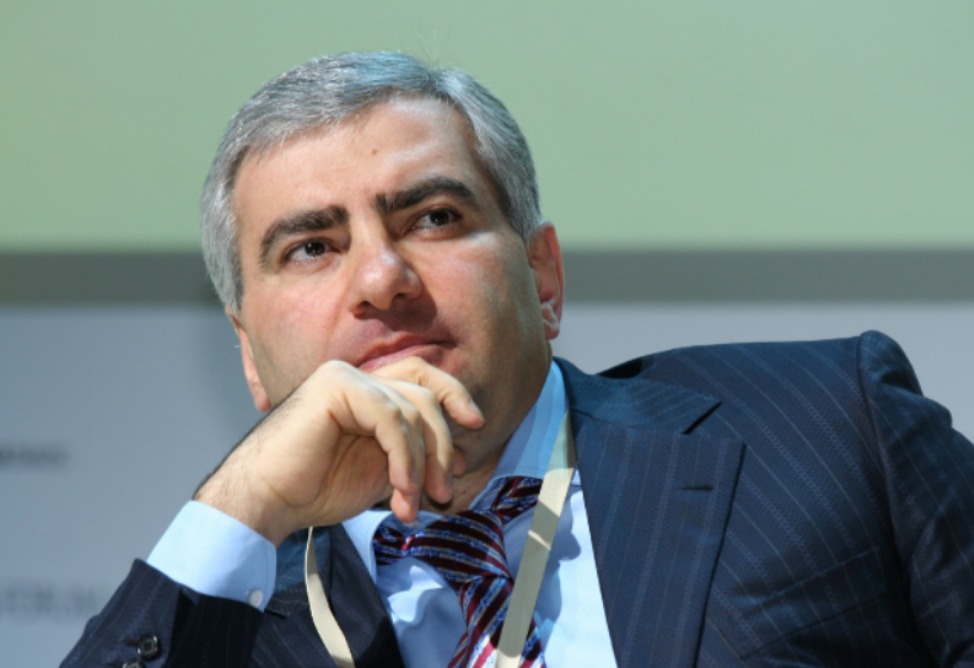Armenian foreign minister ready to meet with his Azerbaijani counterpart
01.09.2020,
14:44
Armenian Foreign Minister Zohrab Mnatsakanyan said in an interview with Interfax that he is ready, for his part, to continue working in the negotiation process on the Karabakh settlement.

YEREVAN, September 1. /ARKA/. Armenian Foreign Minister Zohrab Mnatsakanyan said in an interview with Interfax that he is ready, for his part, to continue working in the negotiation process on the Karabakh settlement.
"Of course, we are ready to meet, and of course we are ready to continue this work," he said in response to a question about whether he is ready to meet with his Azerbaijani counterpart right tomorrow and without any conditions.
In this regard, Mnatsakanyan stressed the importance of searching for compromises, ensuring security and rejecting the use of force and maximalist approaches.
“There are specific and important priorities for Armenia. For us, the issue of the status of Nagorno-Karabakh is an absolute priority. The realization of the right of the people of Artsakh to self-determination without any restrictions, ensuring real, tangible security for Artsakh is an important priority. And we are ready to work with the co-chairs [OSCE MG - ed.] and with the Azerbaijani side to determine formulas that will allow us to compare and measure a possible compromise.
The Armenian foreign minister drew attention to another important issue that concerns Nagorno-Karabakh - full involvement of Artsakh in the negotiation process.
It is a very important issue, he said, and, among other things, is of a practical nature. “Because it will strengthen sense of ownership in relation to the negotiation process on the part of the leadership of Nagorno-Karabakh, which, being elected by the people of Nagorno-Karabakh, has a corresponding mandate to represent their interests," he stressed.
The head of the Armenian foreign policy department did not agree with the opinion that Armenia, in principle, does not really need to settle the problem with Nagorno-Karabakh thinking that the lands have been taken, and the status quo is beneficial.
"I cannot agree with this opinion. Both Armenia and Nagorno-Karabakh are interested in a stable peace in the region. This is possible by reaching a peace agreement based on compromise. Unilateral concessions are ruled out, they cannot have prospects. And we cannot be interested in situations when peace and security in the region do not have stable long-term foundations. In this sense, the peace process for us has been and remains an important priority for resolving this conflict,” he said.
Regarding the activities of the OSCE Minsk Group, Mnatsakanyan said that since the mid-1990s, the format of the OSCE Minsk Group co-chairs, which includes Russia, the United States and France, has been and remains the only format of the negotiation process.
"And it has produced concrete results. This is a format recognized by the international community, which includes three permanent members of the UN Security Council. Three countries that have a sufficiently strong resource – political and diplomatic - in order to implement the mediation function. The involvement of these countries remains very strong," he said.
In his words, over the years, a whole mechanism, a whole catalog of various parameters and approaches has been developed that provide the framework where it is possible to work out a compromise - tangible and real.
"In this sense, we continue and will continue to support this mediation format," he added.
Mnatsaknyan also said that the efforts of the Russian side were very effective. This was visible both during the events in July and before them.
“I am sure that Russia's involvement at all levels underscores the seriousness that Russia has regarding this process and the important contribution that Russia provides together with other co-chairs in the work on a peaceful settlement. Here we have no questions, and all attempts to call into question the work of the co-chairs, which, among other things, is an important deterrent in terms of escalation, as well as to put pressure on the existing format, are unacceptable," the Armenian foreign minister stressed.
Karabakh conflict broke out in 1988 when Karabakh, mainly populated by Armenians, declared its independence from Azerbaijan.
On December 10, 1991, a few days after the collapse of the Soviet Union, a referendum took place in Nagorno-Karabakh, and the majority of the population (99.89%) voted for secession from Azerbaijan.
Afterwards, large-scale military operations began. As a result, Azerbaijan lost control over Nagorno-Karabakh and the seven regions adjacent to it. Some 30,000 people were killed in this war and about one million people fled their homes.
On May 12, 1994, the Bishkek cease-fire agreement put an end to the military operations.
Since 1992, talks brokered by OSCE Minsk Group are being held over peaceful settlement of the conflict. The group is co-chaired by USA, Russia and France. -0---
"Of course, we are ready to meet, and of course we are ready to continue this work," he said in response to a question about whether he is ready to meet with his Azerbaijani counterpart right tomorrow and without any conditions.
In this regard, Mnatsakanyan stressed the importance of searching for compromises, ensuring security and rejecting the use of force and maximalist approaches.
“There are specific and important priorities for Armenia. For us, the issue of the status of Nagorno-Karabakh is an absolute priority. The realization of the right of the people of Artsakh to self-determination without any restrictions, ensuring real, tangible security for Artsakh is an important priority. And we are ready to work with the co-chairs [OSCE MG - ed.] and with the Azerbaijani side to determine formulas that will allow us to compare and measure a possible compromise.
The Armenian foreign minister drew attention to another important issue that concerns Nagorno-Karabakh - full involvement of Artsakh in the negotiation process.
It is a very important issue, he said, and, among other things, is of a practical nature. “Because it will strengthen sense of ownership in relation to the negotiation process on the part of the leadership of Nagorno-Karabakh, which, being elected by the people of Nagorno-Karabakh, has a corresponding mandate to represent their interests," he stressed.
The head of the Armenian foreign policy department did not agree with the opinion that Armenia, in principle, does not really need to settle the problem with Nagorno-Karabakh thinking that the lands have been taken, and the status quo is beneficial.
"I cannot agree with this opinion. Both Armenia and Nagorno-Karabakh are interested in a stable peace in the region. This is possible by reaching a peace agreement based on compromise. Unilateral concessions are ruled out, they cannot have prospects. And we cannot be interested in situations when peace and security in the region do not have stable long-term foundations. In this sense, the peace process for us has been and remains an important priority for resolving this conflict,” he said.
Regarding the activities of the OSCE Minsk Group, Mnatsakanyan said that since the mid-1990s, the format of the OSCE Minsk Group co-chairs, which includes Russia, the United States and France, has been and remains the only format of the negotiation process.
"And it has produced concrete results. This is a format recognized by the international community, which includes three permanent members of the UN Security Council. Three countries that have a sufficiently strong resource – political and diplomatic - in order to implement the mediation function. The involvement of these countries remains very strong," he said.
In his words, over the years, a whole mechanism, a whole catalog of various parameters and approaches has been developed that provide the framework where it is possible to work out a compromise - tangible and real.
"In this sense, we continue and will continue to support this mediation format," he added.
Mnatsaknyan also said that the efforts of the Russian side were very effective. This was visible both during the events in July and before them.
“I am sure that Russia's involvement at all levels underscores the seriousness that Russia has regarding this process and the important contribution that Russia provides together with other co-chairs in the work on a peaceful settlement. Here we have no questions, and all attempts to call into question the work of the co-chairs, which, among other things, is an important deterrent in terms of escalation, as well as to put pressure on the existing format, are unacceptable," the Armenian foreign minister stressed.
Karabakh conflict broke out in 1988 when Karabakh, mainly populated by Armenians, declared its independence from Azerbaijan.
On December 10, 1991, a few days after the collapse of the Soviet Union, a referendum took place in Nagorno-Karabakh, and the majority of the population (99.89%) voted for secession from Azerbaijan.
Afterwards, large-scale military operations began. As a result, Azerbaijan lost control over Nagorno-Karabakh and the seven regions adjacent to it. Some 30,000 people were killed in this war and about one million people fled their homes.
On May 12, 1994, the Bishkek cease-fire agreement put an end to the military operations.
Since 1992, talks brokered by OSCE Minsk Group are being held over peaceful settlement of the conflict. The group is co-chaired by USA, Russia and France. -0---



